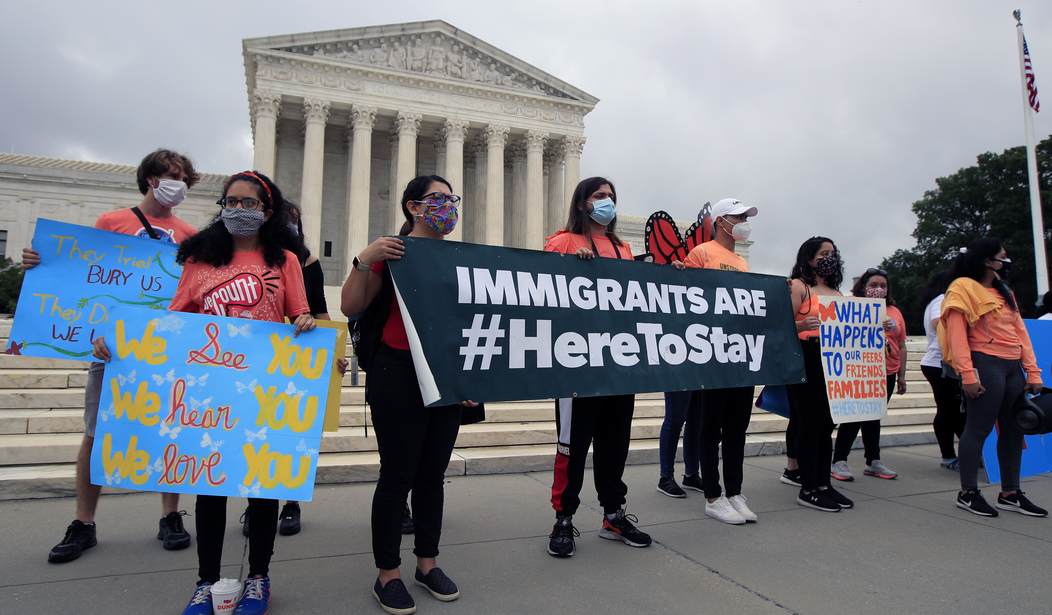On Tuesday, a group of nine states asked a federal judge in Texas to block protections for roughly 800,000 illegal immigrants who came to the U.S. as children and are now adults under the Obama-era Deferred Action for Childhood Arrivals (DACA) program.
The states of Alabama, Arkansas, Kansas, Louisiana, Mississippi, Nebraska, South Carolina, and West Virginia filed a lawsuit against the Biden administration government on the grounds that DACA is an illegally-created program.
The legality of DACA isn’t really in any dispute. Obama had previously acknowledged on multiple occasions that he didn’t have the power to create immigration law unilaterally. “Comprehensive [immigration] reform, that’s how we’re going to solve this problem,” Obama said at the 2010 Cinco de Mayo celebration at the White House. “Anybody who tells you it’s going to be easy or that I can wave a magic wand and make it happen hasn’t been paying attention to how this town works.”
“I am president, I am not king. I can’t do these things just by myself,” Obama admitted later that year.
“Now, I know some people want me to bypass Congress and change the laws on my own,” Obama said the following year during remarks to the National Council of La Raza. “Believe me, the idea of doing things on my own is very tempting. I promise you. Not just on immigration reform. But that’s not how—that’s not how our system works.”
Related: 10 Times Barack Obama Acknowledged That DACA Was Unconstitutional
Obama ultimately decided that he wasn’t beholden to the Constitution but rather to his pro-open borders base, and in 2012, after Democrats failed to get the DREAM Act through Congress, Obama created DACA, rewriting U.S. immigration law via executive pen, despite the long-accepted fact that he had no power to do so. Efforts to end DACA have been unsuccessful, even though challenges continue.
Trump briefly ended DACA in 2017, but in 2020, the Supreme Court ruled that Trump’s efforts to end the program were illegal over procedural technicalities. “We do not decide whether DACA or its rescission are sound policies. ‘The wisdom’ of those decisions ‘is none of our concern,’” Chief Justice John Roberts wrote in his ruling. “We address only whether the agency complied with the procedural requirement that it provide a reasoned explanation for its action.”
Roberts’ ruling seemingly conceded that the decision was less about the constitutionality of DACA than it was about the impact of abolishing it on individuals affected. The fact is, DACA was never constitutional and should not have been introduced in the first place, which is why DACA continues to be challenged in the courts — with the Biden administration fighting on its behalf. In 2021, a federal judge ruled that DACA was illegal; the Biden administration appealed, and in October, the Fifth Circuit Court of Appeals ruled that DACA violates the Administrative Procedure Act but kept the program in place upon further review.
Biden himself acknowledged that the only way DACA can avoid legal challenges is for Congress to codify the program into law. “Only Congress can ensure a permanent solution by granting a path to citizenship for Dreamers that will provide the certainty and stability that these young people need and deserve,” Biden said in 2021.
That this issue is still being fought in the courts is a reflection of the Supreme Court’s failure to address the constitutionality of the program — which, as Barack Obama and I have each pointed out many times, the answer is that it is unconstitutional. And shame on the Supreme Court for not having had the guts to address the constitutionality of the program before.
